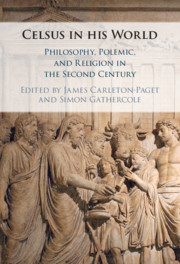Celsus in his World Philosophy, Polemic and Religion in the Second Century
Langue : Anglais
Coordonnateurs : Carleton Paget James, Gathercole Simon

Celsus penned the earliest known detailed attack upon Christianity. While his identity is disputed and his anti-Christian treatise, entitled the True Word, has been exclusively transmitted through the hands of the great Christian scholar Origen, he remains an intriguing figure. In this interdisciplinary volume, which brings together ancient philosophers, specialists in Greek literature, and historians of early Christianity and of ancient Judaism, Celsus is situated within the cultural, philosophical, religious and political world from which he emerged. While his work is ostensibly an attack upon Christianity, it is also the defence of a world in which Celsus passionately believed. It is the unique contribution of this volume to give voice to the many dimensions of that world in a way that will engage a variety of scholars interested in late antiquity and the histories of Christianity, Judaism and Greek thought.
Introduction James Carleton Paget and Simon Gathercole; 1. Of scholarship, piety, and community: origen's purpose(s) in contra celsum Lewis Ayres; Apologetic and internal Christian argument in the contra celsum: a reponse Rowan Williams; 2. Annotations on the literary structure of celsus' alēthēs logos with special reference to the second speech of the Jew Johannes Arnold; The problem of the structure of celsus' alethes logos: a response Simon Gathercole; 3. Celsus as platonist philosopher David Sedley; 4. Celsus' theology: Ineffable logos and impersonal providence George Boys-Stones; 5. Origen's celsus and imperial religiosity Teresa Morgan; Celsus on texts and practices of ritual power: a response Sophie Lunn-Rockliffe; 6. Celsus, or Philosophy and the second sophistic Gretchen Reydam-Schils; Shaping the religious debate from within second sophistic culture: a response Simon Goldhill; 7. Homer in origen, against celsus Richard Hunter; Homer in the polemics between celsus and origen: a response George van Kooten; 8. The gospel according to celsus: Celsus' representation of Christianity Loveday Alexander; Celsus on Christianity – a detractor with a constructive agenda: a response Josef Lössl; 9. The reception of the alethes logos Sébastien Morlet; Literary influence and polemical tradition: a response William Horbury; 10. Celsus' Judaism Philip Alexander; Celsus' Jew as celsus' Christian construct? A response Martin Goodman; 11. The multiple personalities of celsus' Jew Judith Lieu; The distinctiveness of Celsus' Jew: a response James Carleton Paget; 12. Afterword Mark Edwards.
James Carleton Paget is Reader in Early Christianity and Ancient Judaism, University of Cambridge. His interests include the Jewish origins of Christianity and the history of biblical interpretation. He has written a number of books and articles on second-century Judaism and Christianity and is co-editor of the Journal of Ecclesiastical History and Fellow and Tutor at Peterhouse.
Simon Gathercole is Professor of New Testament and Early Christianity at the University of Cambridge. He is the author of Where is Boasting? (Eerdmans, 2003), The Pre-Existent Son (Eerdmans, 2006), The Gospel of Judas (OUP, 2007), The Composition of the Gospel of Thomas (Cambridge, 2012), The Gospel of Thomas (Brill, 2014) and The Apocryphal Gospels (Penguin Classics, 2021). He is the editor of the journal New Testament Studies.
Simon Gathercole is Professor of New Testament and Early Christianity at the University of Cambridge. He is the author of Where is Boasting? (Eerdmans, 2003), The Pre-Existent Son (Eerdmans, 2006), The Gospel of Judas (OUP, 2007), The Composition of the Gospel of Thomas (Cambridge, 2012), The Gospel of Thomas (Brill, 2014) and The Apocryphal Gospels (Penguin Classics, 2021). He is the editor of the journal New Testament Studies.
Date de parution : 11-2021
Ouvrage de 350 p.
16.2x23.6 cm
Disponible chez l'éditeur (délai d'approvisionnement : 14 jours).
Prix indicatif 96,56 €
Ajouter au panierThème de Celsus in his World :
© 2024 LAVOISIER S.A.S.



